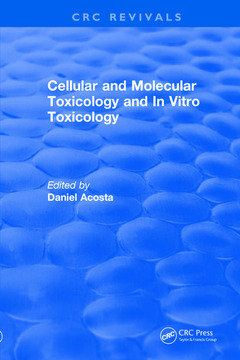Description
Revival: Cellular and Molecular Toxicology and In Vitro Toxicology (1990)
CRC Press Revivals Series
Coordinator: Acosta Daniel
Language: English
Subjects for Revival: Cellular and Molecular Toxicology and In Vitro...:
Keywords
Allison Anne Welder, administration, alcoholic, anthracycline, cardiomyopathy, cardiotoxicity, cocaine, disks, Gordon L, Todd, intercalated, Kenneth Ramos, Paul J, Boor, Philip I, Polimeni, Philip Posner, Phillip S, Mushlin, Richard D, Olson, reticulum, s
Publication date: 01-2019
· 15.2x22.9 cm · Paperback
Publication date: 07-2017
· 15.2x22.9 cm · Hardback
Description
/li>Contents
/li>Readership
/li>Biography
/li>
The Vascular Toxicity of Xenobiotics
P.J. Boor.
The Molecular and Cellular Toxicology of Ethanol on the Heart
P.I. Polimeni and P. Posner
Mechanisms of Anthracycline Cardiotoxicity: Are Metabolites Involved
R.D. Olson and P.S. Mushlin
Cardiotoxicity of Catecholamines
G.L. Todd
The Toxic Effects of Cocaine on the Heart
A.A. Welder
Cellular and Molecular Basis of Xenobiotic-Induced Cardiovascular Toxicity: Application of Cell Culture Systems
K. Ramos
These books may interest you

Mammalian Toxicology 112.17 €



